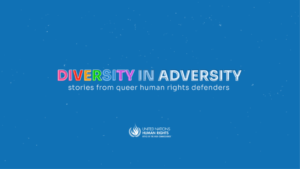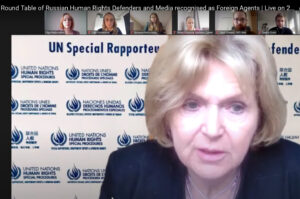As the new year starts and I look back at the situation of human rights defendants in all parts of the world, I welcome encouraging reports from Egypt but I continue to be concerned by remaining challenges.
I am pleased to hear that the father of HRD AbdelRahman Ayyash, was cleared in October 2022 of the charge of joining a terrorist group, apparently in connection to his son’s work on Egypt while in exile.[1] I am also delighted to see that woman human rights defender, Rasha Azab, was acquitted in April 2022 of charges related to her support of six women who claimed a film director had sexually assaulted them.
I welcome the release last summer of a significant number of detained HRDs held under Egypt’s counter-terrorism law, including Ibrahim Ezz El-Din and Amr Imam;[2] journalist and Sinai researcher Ismail Alexandrani;[3] HR lawyer Moh Ibrahim Ramadan;[4] labour rights defender Haitham Mohamadein; and student Ahmed Samir Santawy, who was convicted and sentenced to three years in prison. They were all freed under a presidential pardon process that refers to names submitted by the National Council for Human Rights in cooperation with human rights organisations.
Since late last year however, there has reportedly been a lull in this process, leaving a number of HRDs in lengthy pre-trial detention, with alleged ill-treatment. Four HRD members of the Egyptian Coordination for Rights and Freedoms were arrested as far back as 2018; their trial continues and their next hearing is due in March.[5]
I have also heard about HRDs who are held in new prison establishments where they are allegedly subjected to conditions that may amount to torture. Environment rights defender and veterinary physician Dr. Shawky Abdelsattar Mohamed Amasha, in arbitrary detention since June 2020, was moved in September 2022 to the new Badr Prison, 70 km east of Cairo where he and other inmates are reportedly subjected to continuous camera surveillance under bright electric lights, limited amounts of food and water, and limited family and lawyer visits.[6]
I remain concerned about HRDs who have been freed but continue to face restrictions and precautionary measures, including travel bans, a continuous freeze of assets as well as pending charges.[7] I am closely following the case of Patrick Zaki, a researcher with the Egyptian Initiative for Personal Rights, released in December 2021 after nearly two years in detention. He remains on trial for “spreading false news,” and the “misuse of social media,” in relation to an article he wrote on the treatment of the Coptic Christian minority in Egypt.
I am always ready to discuss with the Egyptian authorities the issues I mentioned here, as well as any other HRD cases.
[1] AL EGY 7/2022 https://spcommreports.ohchr.org/TMResultsBase/DownLoadPublicCommunicationFile?gId=27473
[2] AL EGY 5/2021 https://spcommreports.ohchr.org/TMResultsBase/DownLoadPublicCommunicationFile?gId=26441
[3] UA EGY 1/2016 https://spcommreports.ohchr.org/TMResultsBase/DownLoadPublicCommunicationFile?gId=18020
[4] AL EGY 10/2021 https://spcommreports.ohchr.org/TMResultsBase/DownLoadPublicCommunicationFile?gId=26613
[5] AL EGY 5/2021 https://spcommreports.ohchr.org/TMResultsBase/DownLoadPublicCommunicationFile?gId=26441
[6] AL EGY 10/2022 https://spcommreports.ohchr.org/TMResultsBase/DownLoadPublicCommunicationFile?gId=27632
[7] AL EGY 2/2022 https://spcommreports.ohchr.org/TMResultsBase/DownLoadPublicCommunicationFile?gId=27119



